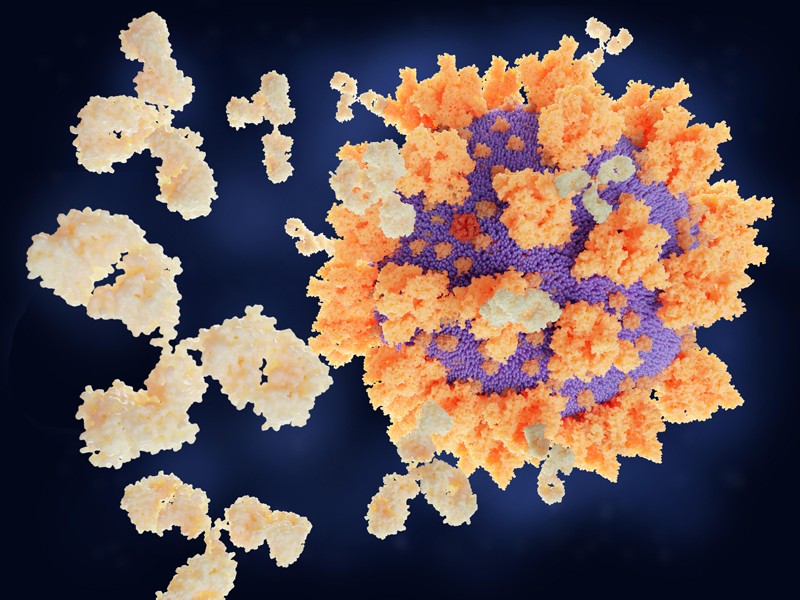Two clinical trials advise that specific antibody therapies can protect against fatalities and hospitalizations among people today with delicate or average COVID-19 — significantly these who are at superior hazard of producing serious sickness.
One particular review found that an antibody against the coronavirus made by Vir Biotechnology in San Francisco, California, and GSK, headquartered in London, diminished the probabilities of hospitalization or loss of life among participants by 85%. In a further demo, a cocktail of two antibodies — bamlanivimab and etesevimab, both made by Eli Lilly of Indianapolis, Indiana — cut the threat of hospitalization and death by 87%.
The analyze effects, both equally declared on 10 March, occur from randomized, placebo-managed, double-blind clinical trials, but have not still been released. They insert to a expanding system of proof that the treatment plans can assist fend off serious illness when administered early, says Derek Angus, an intense-treatment medical professional at the University of Pittsburgh in Pennsylvania.
The antibodies “appear to be incredibly effective”, he claims. “I’m really excited about the results of these trials.”
The body’s all-natural response to viral an infection is to make a range of antibodies, some of which are able to specifically interfere with the virus’s potential to replicate. In the early days of the pandemic, researchers raced to detect the antibodies that are most successful against the coronavirus and to generate them in bulk. The resulting ‘monoclonal antibodies’ have due to the fact been examined in a wide range of options as treatments for COVID-19.
Vir and GSK’s antibody, named VIR-7831, was to start with isolated in 2003 from someone recovering from severe acute respiratory syndrome (SARS), which is induced by a similar coronavirus. The antibody was later on uncovered to bind to the SARS-CoV-2 ‘spike’ protein, also.
The corporations also announced that in laboratory scientific studies1, VIR-7831 bound to SARS-CoV-2 variants — like the fast-spreading 501Y.V2 variant (also referred to as B.1.351) initially determined in South Africa. They attributed the resilience of the antibody to its concentrate on: a particular area of the spike protein that does not have a tendency to accumulate mutations.
Very low uptake
VIR-7831 joins a record of monoclonal antibodies that have been examined towards COVID-19, some of which — such as Lilly’s mix — have now been authorized for use in the United States and elsewhere. But there has been rather small uptake by US medical professionals and their sufferers, states Angus.
One difficulty, he states, is that even though outcomes have been press unveiled and submitted to the US Foodstuff and Drug Administration, providers have nonetheless to publish data from critical clinical trials in peer-reviewed journals. The medicine are also high priced and need to be administered by infusion in a specialized facility, these kinds of as a hospital or outpatient-treatment method centre — a hard activity when healthcare resources have presently been stretched by a surge in situations.
A further obstacle has been combined messaging. Before in the pandemic, some key medical trials involving individuals who experienced been hospitalized with COVID-19 uncovered no advantage from monoclonal antibodies. Several researchers experienced expected that end result: monoclonal-antibody remedy is anticipated to perform ideal early in sickness, and the late-phase signs or symptoms of serious COVID-19 are at times driven additional by the immune program itself than by the virus.
Even so, all those medical-trial failures established a narrative that competed with good results in reports of milder bacterial infections, says Angus, fuelling scepticism. “People would say, ‘But I imagined it did not perform,’” he claims. “It’s absolutely acquiring in the way.”
And though scientific studies in gentle bacterial infections have shown promise, they are far too compact to enable researchers to attract definitive conclusions, says Saye Khoo, a pharmacologist at the College of Liverpool, United kingdom, who is main the Uk AGILE Coronavirus Drug Testing Initiative. Only a modest fraction of individuals with gentle COVID-19 will progress to severe condition, which means that though the trials have enrolled hundreds of participants, the amount of those who have been hospitalized or died was low.
But it will be a long hold out till every person is vaccinated, and monoclonal antibodies could provide an essential bridge amongst vaccines and the treatment options that have been identified for men and women who are hospitalized, suggests Jens Lundgren, an infectious-disorder health practitioner at the University of Copenhagen and Rigshospitalet. “It is not a replacement for vaccines, but it is a prepare B,” he states, introducing that the medications could be especially significant for all those who simply cannot mount an immune response to vaccination.
The pace with which these monoclonal antibodies were being designed retains a lesson for future pandemics, suggests Khoo. “These compounds are with out a question fascinating,” he suggests. “We shouldn’t fail to remember this, mainly because there will be other pandemics coming to us. This has been a genuine lesson in how to be prepared.”

